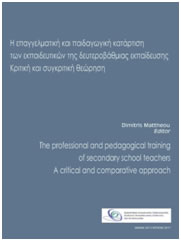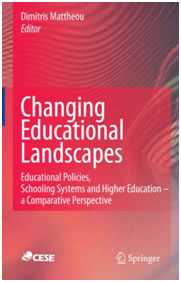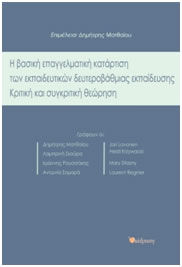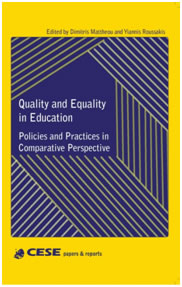New Publications
 |
Η Επαγγελματική και Παιδαγωγική Κατάρτιση των Εκπαιδευτικών της Δευτεροβάθμιας Εκπαίδευσης – Κριτική και Συγκριτική Θεώρηση The Professional and Pedagogical Training of Secondary School Teachers – a critical and comparative approach Εργαστήριο Συγκριτικής Διεθνούς Εκπαιδευτικής Πολιτικής και Επικοινωνίας / Αθήνα / Athens 2011 Το βιβλίο περιλαμβάνει τις εισηγήσεις των ελλήνων και ξένων ειδικών που πήραν μέρος στη διημερίδα που πραγματοποίησε το Εργαστήριο Συγκριτικής Παιδαγωγικής, Διεθνούς Εκπαιδευτικής Πολιτικής και Επικοινωνίας του Παιδαγωγικού Τμήματος Δημοτικής Εκπαίδευσης του Πανεπιστημίου Αθηνών στις 12 και 13 Μαρτίου 2010. Περιλαμβάνει ακόμη τις εισηγήσεις των επιστημονικών ενώσεων που πήραν επίσης μέρος στη διημερίδα, ενώ στο Παράρτημα έχουν ενταχθεί κοινοτικά κείμενα για την εκπαίδευση και την επιμόρφωση των εκπαιδευτικών. |
Η Βασική επαγγελματική κατάρτιση των εκπαιδευτικών δευτεροβάθμιας εκπαίδευσης – κριτική και συγκριτική θεώρηση – Εκδόσεις Διάδραση Αθήνα 2011 Η παιδαγωγική κατάρτιση των εκπαιδευτικών της δευτεροβάθμιας εκπαίδευσης αποτελεί ένα από τα χρονίζοντα ζητήματα της ελληνικής εκπαιδευτικής πολιτικής. Οι διάφορες προσπάθειες που έχουν κατά καιρούς επιχειρηθεί απέτυχαν μέχρι σήμερα να το αντιμετωπίσουν. Ο ανά χέρας συλλογικός τόμος αποτελεί μια συμβολή στην κατανόηση των αιτίων της μεταρρυθμιστικής δυσπραγίας στο συγκεκριμένο πεδίο, την οποία καθιστά ιδιαίτερα σημαντική η συγκριτική οπτική που υιοθετεί ο τόμος και το γεγονός ότι δεν περιορίζεται μόνο στην περιγραφική αποτύπωση της υφιστάμενης κατάστασης και στην καταγραφή των απόψεων για το πρακτέο. Αντίθετα, υιοθετεί μια αναλυτική προσέγγιση του ζητήματος που αποτιμά και συνεκτιμά τόσο τις ιστορικές καταβολές του όσο και το σύγχρονο ελληνικό και ευρωπαϊκό πλαίσιο, το οποίο αναπόφευκτα επηρεάζει σε ένα παγκοσμιοποιημένο κόσμο πολιτικές επιλογές και πρακτικές. |
|
 |
Changing Educational Landscapes: Educational policies, schooling systems and higher education - a comparative perspective Springer Publishers, Dordrecht 2010. Analyzing educational landscapes – the fundamental values, principles and institutions of the sector – is a highly complex and demanding task for any researcher. Like shifting desert sands, these aspects of education are in a constant state of flux, changing according to the unpredictable economic, social, cultural and geo-political circumstances of late modernity. Key aspects of the intricate, fluid and multifarious contemporary setting can always escape the researcher’s necessarily selective observation. The contributors to this book share the view that it is wise, therefore, to take note of other people’s ideas, perceptions and perspectives, to compare notes and reflect critically on them. Thus the papers presented here are a critical and comparative analysis of today’s changing educational landscapes. They are an exploration of some of the forces and factors that induce these changes, and also examine some of their most significant implications. The work takes a fresh look at received ideology and institutional practices and delineates the increasingly internationalized educational discourses and policies. Among other things, the book discusses the obsession with quality in education and the alternative perceptions of educational equality; the rising concern at the obstacles to truly multicultural education, and the debate about the epistemological foundations both of knowledge and knowledge production. Underlying all of the papers in the book is the authors’ intention to enhance our understanding of educational change in this era of transition and to further our appreciation of its multifaceted expressions across the world. |
Quality and Equality in Education – Policies and Practices in Comparative Perspective CESE, 2009. This volume gathers a selection of papers presented in the different Working Groups of the XXIII CESE Conference held in Athens in July 2008. The papers are linked to major changes occurred in educational systems in the last decades about the new geographic 'turn' in educational analysis and discourses, in themes related to the new definitions of social space and internal spaces within which 'schooling systems' or knowledge nodes operate (such as universities, or research institutes, or contract research, or cross-national research). Scholars and researchers from fifteen countries search for contemporary answers to the contradictions of the present debates and where, comparatively speaking are we now?, and where are we going? |
|

